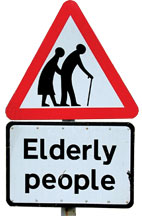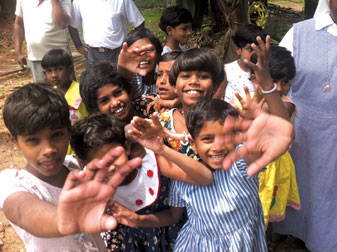|
World Children’s and Elders’ Day on October 1:
Ageing, a major challenge to societies
By Pramod DE SILVA
  Every year, October 1 is dedicated to two very important segments of
the world population: children and elders. They are, perhaps, the
opposite sides of the same coin. Every year, October 1 is dedicated to two very important segments of
the world population: children and elders. They are, perhaps, the
opposite sides of the same coin.
Today’s elders were once children. And today’s children will be
elders one day. But the world will be a very dull place without them.
They make the world a brighter, livelier place.
The International Children’s Day, celebrated in Sri Lanka on October
1 (the date varies in various countries) and the International Day for
the Elderly, celebrated worldwide on October 1, are both very
significant, because they remind us of the importance of children and
elders in society.
Children and elders face many obstacles in today’s commercialised
world. Millions of children are trafficked for labour and prostitution;
armed groups forcibly recruit children to their ranks; nearly 100
million children are denied the right to education; millions more die
before they are five years old due to conflict and disease; girl
children face discrimination in many societies; many others are
subjected to abuse.
But the challenges facing the elderly are no less serious. Older
persons play an invaluable role in all societies - as leaders,
care-givers and volunteers – but they too are vulnerable to
discrimination, abuse, neglect and violence.
This article focuses on these challenges as the world prepares for
the 30th anniversary of the Action Plan on Ageing signed in 1982. This
year also marks the 10th anniversary of the 1991 United Nations
Principles for Older Persons that provide a broader framework for action
on ageing.
 It was in 1990 that the United Nations General Assembly designated
October 1 as the International Day for the Elderly, also known as the
'International Day for Older Persons'. This is the result of the UN
World Assembly on Ageing which was formed in 1982 to explore and tend to
the needs of the elderly in the world. This is imperative, because one
out of every 10 persons is now 60 years or older. It was in 1990 that the United Nations General Assembly designated
October 1 as the International Day for the Elderly, also known as the
'International Day for Older Persons'. This is the result of the UN
World Assembly on Ageing which was formed in 1982 to explore and tend to
the needs of the elderly in the world. This is imperative, because one
out of every 10 persons is now 60 years or older.
Proportion of elderly
By 2050, one of five will be 60 years or older; by 2150, it will be
one out of three persons. Globally, the proportion of persons aged 60
years and older is expected to double between 2000 and 2050, from 10 to
21 percent.
 The proportion of children is projected to drop by a third, from 30
to 21 percent. In 2009, an estimated 737 million persons were 60 years
or over, nearly two-thirds of whom lived in developing countries. Their
number is projected to increase to two billion in 2050, by which time
older persons will outnumber children (those up to 14 years). The proportion of children is projected to drop by a third, from 30
to 21 percent. In 2009, an estimated 737 million persons were 60 years
or over, nearly two-thirds of whom lived in developing countries. Their
number is projected to increase to two billion in 2050, by which time
older persons will outnumber children (those up to 14 years).
In certain developed and developing countries, the number of older
persons already exceeds the number of children. In some developed
countries, the number of older persons will be more than twice that of
children by 2050.
The fastest growing group of the older population is the “oldest old”
that is, those who are 80 years or more.
In 2000, the oldest old numbered 70 million and their numbers are
projected to increase more than five fold over the next 50 years.
In fact, there are suggestions that people will live up to 150-160
years within the next 150 years thanks to advances in medical care and
even 'bionic' devices. (The maximum limit today is generally believed to
be 120 years) Thus ageing has to be taken even more seriously by
governments and societies.
Paradoxically, more people are dying 'young' - at around 50 or 60
years due to factors such as diabetes, obesity, heart disease and lung
disease. Earlier, this trend was apparent only in developed countries,
but with rapid development, countries with emerging economies are also
facing the same problem. Studies on longevity (and even immortality)
must necessarily address this issue, along with viable medical
solutions.
Unfortunately, some young people in developing countries do not even
live up to five years, leave alone old age. Diseases which are easily
preventable and curable claim millions of lives of infants and young
children every year, especially in the poorest parts of the world
including Sub-Saharan Africa. They too will live to a ripe old age if
the world can get together to prevent and cure these maladies. A
fraction of the annual cumulative defence spending of rich countries can
put this right.
It is in this context that the 18 Principles agreed upon by UN Member
States, framed as 18 entitlements that older persons "should have"
should be given more prominence.
Status of elders
They are organised into five areas relating to the status of older
persons: independence; participation; care; self-fulfilment; and
dignity. Under Independence, the UN specifies that: Older persons should
have access to adequate food, water, shelter, clothing and healthcare
through the provision of income, family and community support and
self-help; older persons should have the opportunity to work or to have
access to other income- generating opportunities; older persons should
be able to participate in determining when and at what pace withdrawal
from the labour force takes place; older persons should have access to
appropriate educational and training programs; Older persons should be
able to live in environments that are safe and adaptable to personal
preferences and changing capacities; older persons should be able to
reside at home for as long as possible. (The last one is especially
appropriate at a time when children in many societies try to send their
parents to homes for the aged).
While many countries have made impressive achievements with regard to
the welfare of older citizens vis-ŕ-vis the Millennium Development Goals
(MDG), more needs to be done. For example, in many countries older
persons have benefited from reduced rates of poverty and hunger,
improved access to medicines and health services, and greater education
and work opportunities.
The United Nations has called for granting universal access to social
services; increasing the number and worth of pension plans; and creating
laws and policies that prevent age and gender discrimination in the
workplace.
With just four years left before the 2015 MDG deadline, governments
must offer financial, legal and social protection that will lift
millions of older persons out of poverty and ensure their right to
productive and healthy lives. These points are reflected in this year's
theme for the Elders Day: "The Growing Opportunities and Challenges of
Global Ageing".
But governments alone cannot be expected to handle the challenges
posed by an ageing population, the so-called 'Silver Generation'. The
society does have a role to play. The Elders Day should be celebrated in
our homes first.
Care and respect
We must care for and show respect to our elders, be they parents,
grandparents or elderly relatives. Indeed, any elderly person deserves
our care and respect. These values must be inculcated in the minds of
children. Religious leaders have a special role in this regard.
Our social institutions must be strengthened to raise care levels for
elderly citizens. Fulfilling the physical, psychological and emotional
needs of elders is the key to keeping them healthy and happy. Neglecting
these basics could lead to various physical ailments, psychological and
emotional disorders and even death in some cases. Elders need attention
and care at all times.
This is not only in physical terms (gifts, food, accommodation etc)
but also in terms of 'quality time'. We must spare time for the elderly,
share their happiness and woes and look into their concerns. Remember,
we will all be elders one day. How will the younger generation treat us
if we do not treat our elders properly?
It is only through such a basic approach that we could collectively
fulfil the noble goals espoused by the UN with regard to elders. Today,
elders can lead dignified lives thanks to better social care, medical
facilities, opportunities for self-enhancement and many other factors.
They can and do make a huge contribution to the world we live in - the
world needs their guidance, acumen and wisdom. As we celebrate yet
another World Children's and Elders' Day on October 1, we must reaffirm
our commitment to protect and nurture both these groups. |

